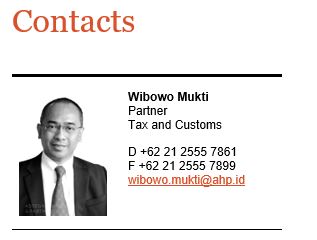Alternative Methods to Calculate Gross Turnover in the Tax Audit
The Minister of Finance (“MoF“) has issued new guidelines for the calculation of gross turnover during a tax audit, under MoF Regulation No. 15/PMK.03/2018 (“Reg 15/2018“), dated 13 February 2018, concerning Alternative Methods to Calculate Gross Turnover. This is an implementing regulation to Article 14 paragraph (5) of Law No. 7 of 1983, as last amended by Law No. 36 of 2008 regarding Income Tax.
Article 14 paragraph (5) of the Income Tax Law and its elucidation provides that when a taxpayer’s real gross income and net income cannot be accurately calculated, because that taxpayer has failed to meet their legal obligations1 to keep these records (“pencatatan“) or accounting books (“pembukuan“), or failed to present them to an auditor with sufficient supporting evidence, auditors will calculate their net income (“penghasilan neto“) using the Deemed Profit Norm, and the Gross Turnover (“peredaran bruto“) on other bases to be set out under forthcoming Ministry of Finance Regulations.
Reg 15/2018 introduces various other methods to calculate the taxpayer’s gross turnover during a tax audit which covers:
- Cash and non-cash transactions:
The tax auditor will calculate the gross turnover under this method based on the available data and/or information of cash and non-cash transaction within a tax year. - Sources and uses of funds:
The gross turnover is calculated based on available data and/or information in a tax year related to the sources and/or uses of funds. - Units and/or volume:
The gross turnover is calculated based on available data and/or information related to the total units and/or volume of business produced in a tax year. - Cost of living calculation:
This method is only applicable for individual taxpayer to calculate his own (and his dependents) cost of living and expenditure to add wealth within a tax year. - Additional net worth:
By this method the tax auditor will compare the beginning and the ending balance of the taxpayer’s net worth in a tax year. - Based on the previous year tax return or the results of the previous year audit:
The tax auditor will use data and information based on the previous year tax return or the result of the previous year audit. - Projection of economic value, and/or:
The calculation of gross turnover will be based on the projection of economic value of business activities at a certain time in a tax year. - Ratio calculation:
This method is used based on a percentage or comparable ratio.
Reg 15/2018 does not provide detailed guidelines on how to implement these methods, stating only that the Director General of Taxation will issue technical regulations to provide guidance on how these methods are to be used in due course.
Before the issuance of Reg 15/2018, in practice, Indonesian auditors typically used similar, indirect methods of calculating Gross Turnover if regular auditing practices could not calculate these figures due to lack of sufficient records/accounting books. Reg 15/2018 establishes a legal basis for the use of Deemed Profit Norm and the other calculation methods listed above.
We will provide further updates on details with respect to implementation as soon as the Director General of Taxes issues the technical regulations.
1The Income Tax Law (Article 14(5)) provides:
- a taxpayer who calculates net income using the Deemed Profit Norm (“Norma Penghasilan Neto“) must keep records – pencataan – as referred to in the provisions of the Law on General Rules and Procedures of Taxation, and
- a taxpayer who fails to inform the Director General of Taxes in choosing Deemed Profit Norm is deemed to have chosen to keep books of account – pembukuan.

***
AHP Client Alert is a publication of Assegaf Hamzah & Partners. It brings an overview of selected Indonesian laws and regulations to the attention of clients but is not intended to be viewed or relied upon as legal advice. Clients should seek advice of qualified Indonesian legal practitioners with respect to the precise effect of the laws and regulations referred to in AHP Client Alert. Whilst care has been taken in the preparation of AHP Client Alert, no warranty is given as to the accuracy of the information it contains and no liability is accepted for any statement, opinion, error or omission.

